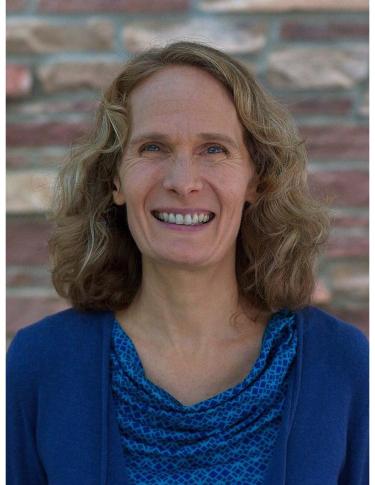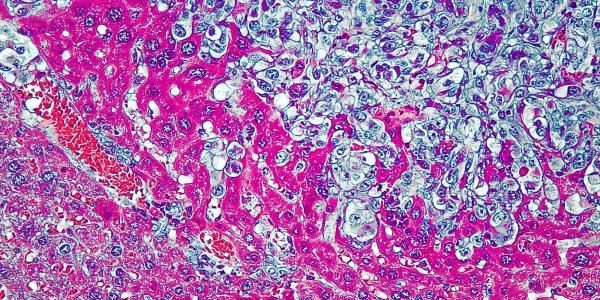Imagine your greatest fear.
Now, write it down and tell it in first-person, as if it’s happening right now. Vividly describe what it looks, sounds, smells, tastes and feels like. Don’t hold back.
Such an exercise could be daunting for anyone, dredging up feelings we try to avoid. But for late-stage cancer patients struggling with anxiety and other mental health issues, it can be remarkably therapeutic, new CU ɫ������ research has found.
“It’s often easier to write about something traumatic than to speak it out loud, especially to someone you don’t know that well,” said Joanna Arch, a professor in the Department of Psychology and Neuroscience who describes the novel therapy in the . “Our findings suggest that participants can write their way into greater wellness in the form of strongly reduced cancer-related trauma, depression, anxiety and fear.”��
Arch developed the therapy, known as written exposure-based coping (EASE), to fill what she saw as a critical gap in mental health offerings for the growing number of people who—thanks to life-extending medications—are living with advanced cancer.��
Nearly 700,000 people in the U.S. currently have metastatic, or Stage IV, cancer, according to the National Cancer Institute.
Yet most mental health therapies have been designed to help early-stage patients, often with curable cancers, cope with fear of recurrence or progression.��
“Their fears are very real, but they are often fearing something that, fortunately, will never happen,” said Arch, a member of the CU Cancer Center, which funded the study.
When she talked with late-stage cancer patients, many of them well-aware that they could ultimately die of their disease, they said existing offerings didn’t resonate.��
“These patients live in the face of radical uncertainty about the future—knowing that at some point, the medication could stop working,” she said. “Their experience is very different, and far less attention has been paid to them.”

��Their worst fear is playing in the back of their minds much of the time. Taking that monster out of the closet and naming it reduces its power.
–Joanna Arch
5 sessions of facing fears��
Arch modeled EASE after a practice called “written exposure therapy” (WET) which prompts people with post-traumatic stress disorder (PTSD) to write in-depth about past traumas.��
EASE focuses instead on what could lie ahead.
In the first of five one-hour Zoom sessions, participants identify their greatest cancer-related fear, delving beyond progression or death to pinpoint what, precisely, scares them most.��
Some fear pain or being forgotten while others say they most fear saying goodbye to their children.��
Then the writing begins.
Participants are instructed to tell a story with beginning, middle and end, including how this worst-case scenario makes them feel. In the final sessions they’re asked to consider how realistic that scenario is and either craft a plan to cope with the inevitable or, if possible, take steps to create a better scenario.��
They’re given time to check-in with their therapist and urged to, if big feelings come up in between sessions, let them in.
Thus far, the results have been promising.
In a pilot trial of 29 adults with Stage III or IV cancer or incurable blood cancer, 25 completed all sessions—a feat in and of itself given what they were asked to do, said Arch.
Measures of cancer-related trauma, anxiety, depression, fear of death and dying, fatigue and even hopelessness all improved significantly after treatment and remained better after four and a half months.
“I was just going through life pretending that everything was fine and burying it,” said mother-of-four Melissa Sanchez, who joined the trial to help with panic attacks and anxiety after undergoing three surgeries and 16 rounds of immunotherapy for Stage III melanoma.��
She’s had clear scans for two years, feels physically great and hasn’t had a panic attack since therapy. She only wishes she had started writing earlier.
“I remember that first day just crying—I had a sound come out of me that I didn’t even recognize it was buried so deep. Writing it down helped me to own my feelings. I feel at peace with things now.”
‘Name it to tame it’
Why does it work so well?
Research has long shown that avoidance can exacerbate fear and intensify trauma symptoms. Writing about that fear in exquisite detail for hours can “radically counter” that avoidance, said Arch.
“For many of these patients, their worst fear is playing in the back of their minds much of the time and they don’t really have anyone to talk to about it,” she said. “Taking that monster out of the closet and naming it reduces its power.”��
Identifying solutions can also be empowering. For instance, one study participant who feared what would happen to her pet wrote down a plan for how they should be cared for. Another, who most feared her family wouldn’t remember her, created a scrap book to leave them.
Arch cautions that the therapy is not for everyone, and more research is necessary before she can broadly recommend it. She hopes to launch a larger trial as soon as possible.
She also sees potential applications for people with other terminal illnesses, including ALS and other neurodegenerative diseases.
“These are populations who may have limited time left on Earth. My goal for them is not to eliminate their distress, because that’s not practical in the face of something like a late-stage cancer diagnosis. But we can help them live their best life possible with the precious time they have.”


